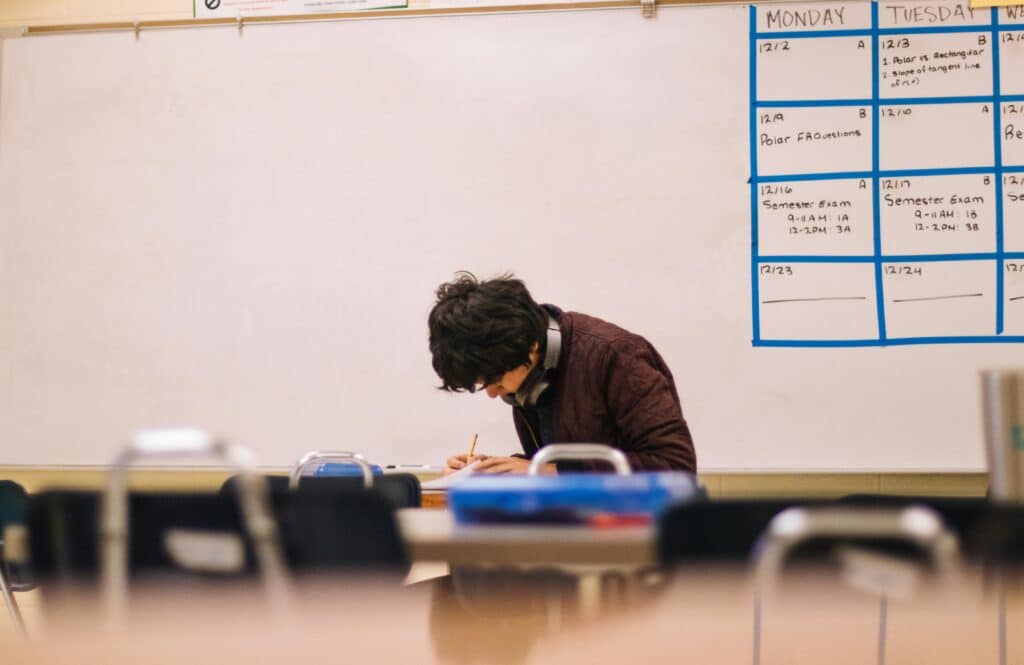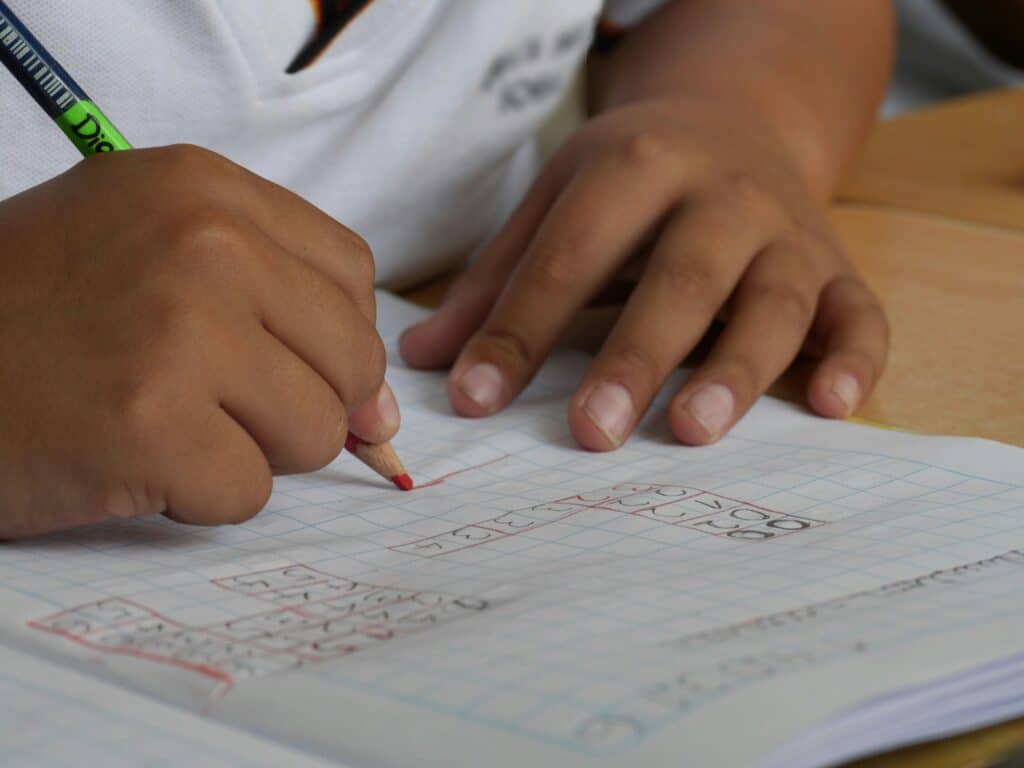
You step through the doors of your new high school for the very first time, backpack heavy on your shoulders, clutching your schedule like a lifeline. Your stomach churns as you scan the crowded hallways filled with upperclassmen who seem to know exactly where they’re going. That knot in your chest? Every freshman feels it. The good news is that thousands of students have walked these same halls before you and not only survived their first year of high school – they thrived.
This comprehensive guide is designed specifically for first year high school students who want to make the transition from middle school as smooth as possible. You’ll discover proven strategies that work, real advice from students who’ve been there, and practical tips you can start using from day one.
Here’s what you’ll learn to master your freshman year:
• How to make genuine friendships that last beyond graduation
• Academic habits and organization systems that set you up for success without burning out
• Ways to build positive relationships with teachers and school staff
• Smart strategies for getting involved in activities that match your interests
• Techniques for handling social pressure and navigating tricky situations
• Methods for maintaining your health and well-being during this big transition
Your first year doesn’t have to be something you just “survive” – it can be the foundation for four amazing years ahead. You’ll face new challenges, meet incredible people, and discover parts of yourself you never knew existed. Ready to turn those first-day butterflies into confidence? Let’s dive in.
Master the Art of Making Friends and Building Relationships

Approach new people with genuine kindness and a positive attitude
Your first year of high school is the perfect time to practice approaching others with authentic warmth. When you meet someone new, focus on being genuinely interested in them rather than worrying about making the perfect impression. Simple acts of kindness, like complimenting someone’s outfit or offering help with homework, can serve as natural icebreakers that lead to meaningful conversations.
Remember that everyone is looking to connect, even if it doesn’t always seem obvious. Your positive attitude becomes contagious when you smile, make eye contact, and show genuine interest in others. Practice reminding yourself of your strengths and focus on what makes you unique – this confidence will naturally shine through when meeting new people.
Start conversations naturally by asking questions about shared classes
One of the easiest ways to connect with classmates is by focusing on your shared experiences in school. Ask open-ended questions like “What do you think about today’s assignment?” or “How are you finding this class so far?” These conversation starters feel natural and give you immediate common ground to build upon.
Active listening plays a crucial role in these interactions. When someone responds to your questions, show genuine interest by asking follow-up questions such as “What do you like most about that class?” or “How did you get into that subject?” Non-verbal cues like nodding and maintaining eye contact demonstrate that you’re engaged and interested in what they’re saying.
Keep an open mind and avoid limiting yourself to one friend group
As a first year high school student, it’s important to resist the urge to settle into just one social circle. Different friend groups offer various perspectives and experiences that can enrich your high school journey. You might find that you connect with the art club members during creative projects, bond with classmates in your math study group, and enjoy hanging out with teammates from sports activities.
Building trust with different people takes time, so start with casual interactions across various groups. Sit with different people at lunch, chat with classmates between classes, and participate in diverse school activities. These small steps help you discover where you naturally fit while keeping your social options open.
Find common interests with other students to build connections
Discovering shared interests is one of the most effective ways to build lasting friendships. Join clubs, sports teams, or activities that align with your passions – if you love art, consider the art club or drawing classes. School events like dances, sports games, and volunteer projects provide excellent opportunities to connect with classmates who share similar values and interests.
Career-focused classes and group projects also create natural bonding opportunities. When you work alongside others who share your academic goals or participate in elective courses like drama, you’re more likely to find people with compatible interests and personalities.
Key bullets for making friends successfully:
• Practice simple conversation starters and compliments
• Show genuine interest through active listening and follow-up questions
• Participate in diverse activities to meet different types of people
• Be dependable and follow through on plans you make
• Share small personal stories gradually to build connections
• Celebrate small wins like introducing yourself to someone new
Establish Strong Academic Habits and Organization Systems

Use a Weekly Planner to Track Assignments, Tests, and Deadlines
Now that you understand the importance of organization in your first year, implementing a weekly planner system becomes crucial for managing your academic responsibilities. You’ll find that writing things down on a digital or paper calendar helps free up your attention for learning by eliminating the worry of having to remember everything. Planning for a full week rather than one day at a time gives you more time to work with, so you can create a more realistic schedule for yourself.
Pick a calendaring tool that lets you plan by the hour and include your classes and other fixed obligations like meetings, appointments, and practices. Take 30 minutes each weekend to plan the upcoming week, looking at what work you need to do and scheduling time for specific assignments. Consider using digital planners like MyStudyLife, which is a free cross-platform planner built specifically for students that helps you schedule and repeat your classes, track assignments, exams, and revision tasks, and get automatic reminders for upcoming deadlines.
Create a Dedicated Organizational System with Folders for Each Class
Your organizational system should include both physical and digital components for maximum effectiveness. For physical materials, use a color-coded binder system where you assign a unique color to each subject (e.g., red for Math, green for Science). Use dividers for notes, homework, and class handouts, and store all binders in the same order in your bag or locker to create muscle memory. Stick matching colored labels on your notebooks and folders for consistency.
For digital organization, store everything in one place by picking a platform you can access easily and sticking with it. Create folders to organize your files by thinking about the types of digital files you generally use. You might create a folder for each of your courses, which you can further organize by quarter and academic school year. Make it a habit to organize new files right away – the moment you get or create a new file, decide what folder it fits into and save it there.
Build Effective Study Habits Early When the Workload Is Manageable

With your organizational foundation in place, you can now focus on developing study habits that will serve you throughout high school. Start a weekly Sunday reset ritual that sets the tone for a calm, focused week. Each Sunday, review last week’s progress, look ahead at tests, deadlines, and busy days, clean your workspace and backpack, and update your planner.
Try the task-triage method to prioritize effectively. Every morning or night, split your to-do list into three categories: must do today, nice to do today, and can do later. This teaches you how to prioritize – something every first year high school students tips guide should emphasize. Use your chosen planning tool to assign deadlines and mark priority levels, then revisit your list at night and adjust as needed.
Discover Your Learning Style Through Visual Aids, Flashcards, or Active Recall
Finding a note-taking system that works for you is essential for retaining important information and connecting course concepts. Consider what works best for your learning style – do you prefer the increased engagement and retention that comes from taking notes by hand, or is it more important that you have the ability to search for specific terms when reviewing your notes?
Try to be consistent in how you take notes for a single class, as varying your style too much requires you to reorient yourself each time you review your notes. Store your notes in a place where you are likely to look often, since research shows that reviewing your notes within 24 hours of taking them helps you retain 40% more information than if you wait a week or more.
| Study Method | Best For | Implementation Tips |
|---|---|---|
| Visual Aids | Visual learners who prefer diagrams and charts | Use color-coding, mind maps, and graphic organizers |
| Flashcards | Memorization and quick recall | Create digital or physical cards, review daily |
| Active Recall | Deep understanding and long-term retention | Quiz yourself, teach concepts to others, practice problems |
Build Positive Relationships with Teachers and Authority Figures

Show Respect by Listening Carefully and Not Speaking Out of Turn
Building positive relationships with your teachers starts with demonstrating basic respect in the classroom. When your teachers are speaking, make eye contact, put away distractions, and focus on what they’re saying. This simple act of active listening shows that you value their time and expertise. Avoid interrupting or talking while they’re teaching, as this disrupts the learning environment for everyone and can quickly damage your reputation with authority figures.
Your teachers notice when you’re genuinely engaged versus when you’re just going through the motions. By consistently showing respect through your body language and attention, you create a foundation of trust that will serve you well throughout your first year of high school.
Participate Actively in Class Discussions and Volunteer to Help
Once you’ve established yourself as a respectful listener, take the next step by actively participating in classroom activities. Raise your hand to answer questions, contribute thoughtfully to discussions, and volunteer for classroom tasks when opportunities arise. This level of engagement demonstrates that you’re invested in your education and willing to be part of the classroom community.
Teachers appreciate students who help create a positive learning environment. Whether it’s volunteering to pass out papers, helping with classroom setup, or offering to assist a struggling classmate, these small gestures show initiative and consideration that teachers remember and value.
Complete Every Assignment and Ask Questions When Needed
Your academic performance directly reflects your respect for your teachers’ efforts. Complete all assignments on time and put genuine effort into your work. When you struggle with concepts or need clarification, don’t hesitate to ask questions. Teachers want their students to succeed, and asking for help shows maturity and dedication to learning.
Remember that teachers can provide the most effective support when you communicate your needs clearly. If you’re having trouble understanding material, approach them before or after class, or during designated office hours. This proactive approach demonstrates responsibility and helps prevent small issues from becoming major problems.
Start Strong to Develop a Reputation as a Respectful and Engaged Student
Your reputation with teachers begins forming from day one of your first year of high school. Teachers remember students who consistently demonstrate respect, engagement, and responsibility. By establishing these positive behaviors early, you create a foundation that benefits you throughout the school year.
When teachers see you as trustworthy and engaged, they’re more likely to offer additional support, provide meaningful feedback, and even serve as references for future opportunities. This positive reputation also means teachers will be more understanding if you occasionally make mistakes or need extra help.
Key Practical Takeaways:
- Greet your teachers warmly by name at the beginning and end of each class
- Maintain consistent eye contact and active listening during instruction
- Complete a weekly check-in with each teacher to ask about your progress
- Volunteer for classroom responsibilities like distributing materials or helping with technology
- Ask specific questions when you need clarification rather than saying “I don’t understand”
- Thank your teachers for their help and feedback to show appreciation
- Follow up on their suggestions and let them know how their advice helped you improve
Challenge Yourself Academically While Maintaining Balance

Take on difficult classes but know your personal limits
You should prioritize challenging yourself academically while being realistic about your commitments. Don’t attempt too much at once, as spreading yourself too thin is worse than concentrating on a few things you’re passionate about. It’s crucial to set limits on your commitments because you won’t be able to accomplish any of them well if you take on too much.
Don’t shy away from advanced courses like AP classes
Advanced courses provide valuable opportunities for personal growth and skill development. However, you need to balance academic achievement with your other responsibilities effectively. Use a planner or calendar to track your schoolwork and commitments, helping you stay organized and avoid feeling overwhelmed while pursuing these challenging academic opportunities.
Key Takeaways:
- Set realistic limits on your academic commitments
- Use planning tools to manage your coursework effectively
- Focus on quality over quantity in your course selections
- Don’t be afraid to challenge yourself with advanced classes
- Balance academic pursuits with other school activities
Get Involved in School Activities and Extracurriculars

Join clubs that align with your interests and passions
Previously, I’ve emphasized the importance of building relationships and establishing good academic habits. Now that we have covered those foundations, it’s time to explore one of the most rewarding aspects of high school: getting involved in activities that truly excite you.
Your high school likely offers dozens of extracurricular opportunities across various categories. The key is identifying what genuinely interests you rather than what you think looks impressive. Whether you’re drawn to academic clubs like Math Olympiad or Science Olympiad, creative outlets like Drama Club or Art Club, or special interest groups like Chess Club or Anime Club, there’s something for everyone.
Start by making a list of your current interests and things you’ve always wanted to try. If you love technology, consider joining Computer Science Club, Girls Who Code, or Robotics Club. If you’re passionate about making a difference, look into community service organizations like Key Club, Leo Club, or Red Cross Club. For those interested in leadership and government, Student Council, Mock Trial, or Model UN might be perfect fits.
Don’t limit yourself to school-sponsored activities. Community groups, religious organizations, and volunteer opportunities can be equally valuable. Remember, colleges appreciate students who pursue their passions authentically rather than those who simply accumulate activities for their resume.
Try out for sports teams or participate in school events
With this in mind, next, we’ll explore how athletic participation and school events can enhance your high school experience. Sports offer unique opportunities to demonstrate leadership ability, especially as you progress and potentially serve as team captain.
Your school likely offers traditional sports like basketball, soccer, football, volleyball, and track & field. However, don’t overlook less conventional options that might suit your interests better. Many schools now offer activities like ultimate frisbee, rock climbing clubs, martial arts, or even competitive gaming.
If your school has limited sports options, explore community recreational leagues. You might find opportunities in archery, bowling, cycling, fencing, gymnastics, sailing, or skiing. These community-based activities count just as much as school teams and often provide more flexible scheduling.
Beyond competitive sports, consider participating in school events like theater productions, talent shows, academic competitions, or cultural celebrations. These events help you connect with your school community and often require less long-term commitment than joining a team, making them perfect for testing new interests.
Use activities as opportunities to meet like-minded students

Now that you understand the variety of options available, it’s important to recognize how these activities serve as natural friendship-building opportunities. When you join activities based on genuine interests, you’ll automatically surround yourself with peers who share your passions.
Academic clubs like National Honor Society, Quiz Bowl, or subject-specific groups attract students who value learning and intellectual growth. Creative activities such as yearbook committee, poetry club, or film production club bring together artistic minds. Service organizations like Habitat for Humanity or UNICEF clubs connect you with community-minded individuals.
The beauty of activity-based friendships is that you already have common ground for conversation and collaboration. Working together toward shared goals—whether preparing for a debate tournament, organizing a charity fundraiser, or rehearsing for a performance—naturally builds strong bonds.
These connections often extend beyond the activity itself, creating study groups, social circles, and lasting friendships that can support you throughout high school and beyond.
Don’t let fear of being “uncool” prevent you from participating
Finally, it’s crucial to address one of the biggest barriers first year high school students face: the fear of judgment. Many freshmen avoid activities they’re genuinely interested in because they worry about social perception or appearing “uncool.”
This mindset is not only limiting but counterproductive. Colleges don’t evaluate activities based on perceived coolness—they look for genuine passion, commitment, and growth. A student deeply involved in activities like Dungeons & Dragons Club, Crochet Club, or Astronomy Club often stands out more than someone half-heartedly participating in stereotypically “popular” activities.
Here’s a practical framework for exploring your passions without social anxiety:
| Activity Type | Examples | Passion Indicators | Benefits |
|---|---|---|---|
| Academic | Math Team, Science Olympiad, Philosophy Club | You enjoy intellectual challenges | Develops critical thinking, college preparation |
| Creative | Art Club, Creative Writing, Drama | You love self-expression | Builds confidence, communication skills |
| Service | Environmental Club, Tutoring, Community Volunteer | You want to help others | Creates meaningful connections, develops empathy |
| Special Interest | Chess, Gaming, Cultural Clubs | You have unique hobbies | Finds your tribe, celebrates individuality |
Remember, the students who embrace their authentic interests often become the most respected and well-liked members of their school community. Your genuine enthusiasm for activities you care about is far more attractive than forced participation in activities you think you should like.
The key is starting early in your first year when social hierarchies are still forming and everyone is finding their place. This gives you the freedom to explore without the pressure of established social expectations.
Manage Your Health and Well-being Effectively

Maintain a Healthy Sleep Schedule and Avoid Staying Up Too Late
Your sleep schedule forms the foundation of your physical and mental well-being during your first year of high school. Aim for consistent bedtimes and wake times, even on weekends, to help your body establish a natural rhythm. Create a calming bedtime routine that signals to your brain it’s time to wind down—this might include putting your phone away at least an hour before bed, as the blue light can interfere with your sleep quality.
Eat a Balanced Diet with Vegetables, Whole Grains, and Lean Protein
Proper nutrition directly impacts your energy levels, concentration, and mood throughout your school day. Focus on incorporating a variety of vegetables, whole grains, and lean proteins into your meals to fuel your body and brain effectively. A nutritious, balanced diet promotes overall wellness and helps you maintain the stamina needed for academic challenges and extracurricular activities.
Take Time to Relax and Do Activities You Enjoy
Now that we’ve covered the physical foundations of health, it’s equally important to prioritize your mental wellness through relaxation and enjoyable activities. Practice calming techniques like deep breathing exercises, mindfulness, or yoga to help manage stress and stay centered. Whether it’s playing a sport, reading, or spending time with friends, make sure to schedule activities that bring you joy and help you decompress from academic pressures.
Seek Help from Counselors or Trusted Adults When Feeling Overwhelmed
Previously, I’ve emphasized self-care practices, but recognizing when you need additional support is equally crucial for your well-being. Don’t hesitate to reach out to school counselors, teachers, parents, or other trusted adults when you’re struggling with stress, anxiety, or overwhelming feelings. These professionals are there specifically to help you navigate challenges and can connect you with appropriate resources and coping strategies.
Steps You Can Take for Better Health:
• Establish consistent sleep and wake times – Aim for 8-9 hours of sleep nightly and maintain the same schedule on weekends
• Create a phone-free bedroom environment – Charge your device outside your room to improve sleep quality
• Practice stress-reduction techniques – Try diaphragmatic breathing, meditation, or progressive muscle relaxation when feeling overwhelmed
• Build a balanced meal routine – Include vegetables, whole grains, and lean proteins in your daily diet
• Schedule regular downtime – Block out time each day for activities you genuinely enjoy
• Stay physically active – Incorporate movement into your day to boost mood and reduce stress hormones
• Connect with your support network – Regularly check in with friends, family, and mentors
• Know when to ask for professional help – Reach out to counselors when stress becomes unmanageable
Handle Social Challenges and Peer Pressure Wisely

Deal with bullying by staying calm and reporting incidents to adults
When facing bullying situations, your response can make all the difference. Stay calm and avoid escalating the situation through retaliation or emotional reactions. Document incidents and report them immediately to trusted adults like teachers, counselors, or parents. Remember that seeking help isn’t weakness—it’s the smart approach to handling harassment.
Stand up for other students who are being bullied
You have the power to be a positive influence when witnessing bullying. Speaking up for others creates a ripple effect that can change the entire social dynamic. Even having one person stand with someone against negative peer pressure makes it much easier for both people to resist harmful situations and demonstrates true leadership.
Navigate dating decisions at your own pace without pressure
• Listen to your gut feelings about relationships and don’t rush into situations that make you uncomfortable
• Plan ahead for pressure situations and decide your boundaries before you’re in the moment
• Use “bail-out” phrases with parents if you need an escape from uncomfortable dating scenarios
• Choose friends who respect your decisions and timeline regarding relationships
Remove yourself from situations involving drugs, alcohol, or vaping
• Learn to feel comfortable saying “no” without lengthy explanations or apologies
• Arrange code phrases with parents to extract yourself from dangerous situations
• Blame your parents if needed: “My mom would kill me, and her spies are everywhere”
• Hold a water bottle or soda to reduce offers of unwanted substances
• If situations seem dangerous, don’t hesitate to get adult help immediately

Your first year of high school doesn’t have to be overwhelming when you have the right strategies in place. By focusing on building genuine friendships, establishing strong study habits, connecting with teachers, and maintaining balance between academics and activities, you’re setting yourself up for not just survival, but success. Remember that everyone around you is navigating the same challenges – you’re not alone in feeling uncertain or excited about this new chapter.
The key to thriving in high school lies in taking advantage of every opportunity while staying true to yourself. Don’t be afraid to join clubs, try new activities, or introduce yourself to classmates. As one rising senior shared, “The days are long but the years are short” – so make the most of each moment. Challenge yourself academically, but know your limits. Build those healthy habits now when the workload is manageable, because they’ll serve you well throughout all four years.
Key Takeaways Summary
| Section | Primary Focus | Essential Actions |
|---|---|---|
| Making Friends & Relationships | Building genuine connections | • Don’t overthink interactions<br>• Treat everyone as a potential friend<br>• Start conversations naturally |
| Academic Habits & Organization | Establishing strong foundations | • Use a weekly planner daily<br>• Create dedicated folders for each class<br>• Build study habits early when workload is lighter |
| Teacher Relationships | Creating positive connections | • Show respect and engagement in class<br>• Ask questions and participate actively<br>• Remember teachers can become valuable advocates |
| Academic Balance | Challenging yourself wisely | • Take on difficult classes but know your limits<br>• Balance academics with social activities<br>• Focus on learning, not just grades |
| School Involvement | Maximizing opportunities | • Join clubs that match your interests<br>• Try out for teams or activities<br>• Attend school events and games |
| Health & Well-being | Maintaining physical/mental health | • Get adequate sleep and nutrition<br>• Take time to relax when stressed<br>• Seek help when needed |
| Social Challenges | Handling peer pressure wisely | • Stand up to bullying behavior<br>• Remove yourself from dangerous situations<br>• Don’t let others dictate your choices |
References
Benner, A. D., & Graham, S. (2011). The transition to high school: Current knowledge, future directions. Educational Psychology Review, 23(3), 299–328. https://pmc.ncbi.nlm.nih.gov/articles/PMC3182155/
Frontiers in Psychology. (2024). Adolescents’ academic performance: What helps them and what hinders them — A qualitative study. Frontiers in Psychology. https://www.frontiersin.org/articles/10.3389/fpsyg.2024.1350105/full
National Association of State Boards of Education. (2024). Promoting students’ well-being during the transition to high school. https://www.nasbe.org/promoting-students-well-being-during-the-transition-to-high-school/
Wang, Y., & Zhang, L. (2023). The impact of distance learning on first-year high school students’ motivation and performance. Journal of Educational Research and Practice. https://pmc.ncbi.nlm.nih.gov/articles/PMC10007642/
Zins, J. E., Weissberg, R. P., Wang, M. C., & Walberg, H. J. (2004). Building academic success on social and emotional learning: What does the research say? Teachers College Press.
Centers for Disease Control and Prevention. (2024). Youth physical activity: Recommendations and guidelines.https://www.cdc.gov/physical-activity-basics/guidelines/children.html
Holland, A., & Andre, T. (1987). Participation in extracurricular activities in secondary school: What is known, what needs to be known? Review of Educational Research, 57(4), 437–466. https://doi.org/10.3102/00346543057004437
“Predictors of Academic Performance in High School Students.” (2023). PLoS ONE.https://pmc.ncbi.nlm.nih.gov/articles/PMC9365103/

